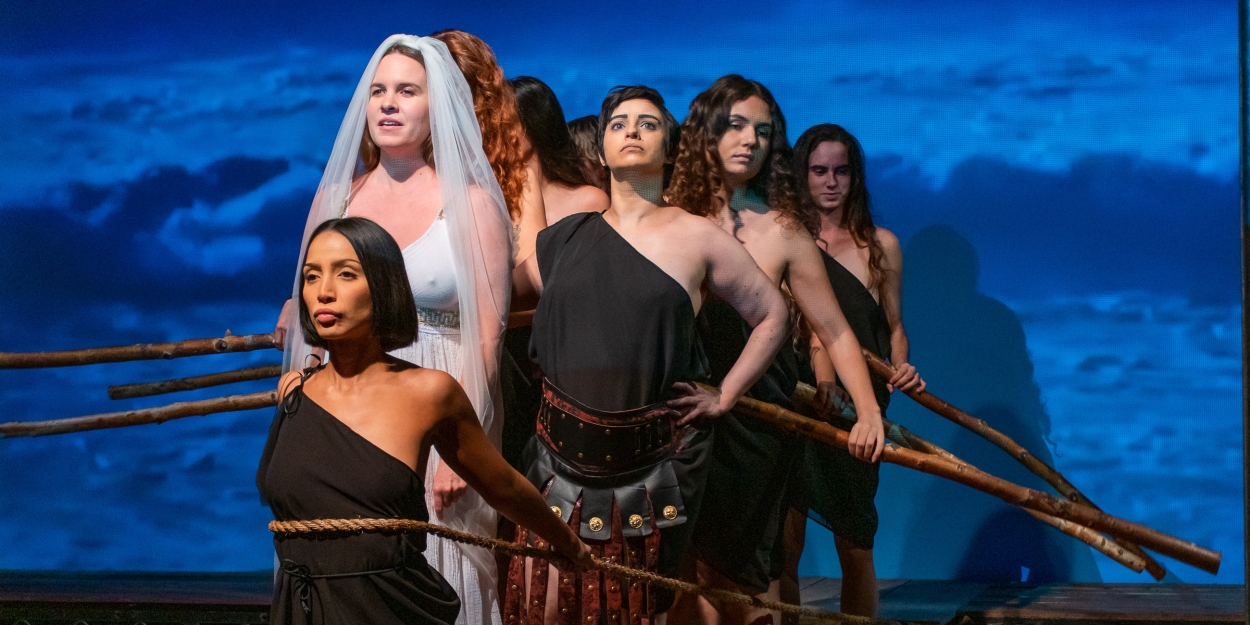Review: THE PENELOPIAD at City Garage
Reconsidering the Odyssey in a #MeToo Landscape

Greek mythology's Penelope is known for her legendary, and at times incomprehensible patience. Left by her husband Odysseus who biffs off for a couple of decades first to fight in the Trojan War and then to face innumerable perils on his journey home, Penelope bides her time in Ithaca waiting spaniel-like for his return.
Well, the Penelope envisioned by Margaret Atwood is nobody's doormat. Within THE PENELOPIAD, the epic re-write that bears her name, the misrepresented Queen of Ithaca recounts her history and her gripes from a kind of purgatory in Hades in the interest of setting the record straight. "After I was dead, they turned me into a story; though not the kind of story I would have preferred to hear," says Peggy Flood's Penelope, early on in City Garage's production, her bitterness quite apparent. "Now that all the others have run out of air, it's my turn." All right then, your highness. The mic is yours.
Where the much-acclaimed TV adaptation of Atwood's THE HANDMAID'S TALE coincides with the heat of the #MeToo movement, not every Atwood adaptation is created equal. City Garage's PENELOPIAD, directed by Frederique Michel, gets its points across with all the subtlety of a neon green Trojan horse. Part of that is the fault of Atwood's script, (adapted from her 2005 novel) and part is Michel's production. Her 13-person, all-female cast works hard, takes some significant creative risks and delivers several affecting moments. But despite some nice visuals within Michel's staging, the production is more angry than it is poignant. And in a story that is rife with themes of female exploitation, it feels curious that a production directed by a woman would contain this much female nudity, some of it random and gratuitous.
Michel has two characters playing title character into an older and younger version, with Flood's mature Penelope narrating and rarely leaving the stage, while the younger Spartan princess (played by Lindsay Plake) takes us through the character's childhood, her marriage to Odysseus (Emily Asher Kellis) and her early years following his departure for Troy. Ensemble members play various characters out of Homer, both male and female. The centerpieces - and certainly martyrs - of Atwood's Homeric reconsideration are the 12 maids who attend to and protect our heroine, only to wind up unjustly put to death by Odysseus when he finally returns.
These maids make their first appearance dramatically, bare-breasted with nooses around their necks, and chanting a dirge-like anthem. And as the maids' story unfolds, it becomes clear that the injustices done to them significantly outweighs Penelope's wrongs. Atwood would even argue that Penelope is in some measure responsible for their deaths. The maids are all given names, but that's something of a dodge since they are basically interchangeable. (Odysseus's treacherous nurse, Eurycleia, (Geraldine Fuentes) is culpable as well.)
And who are the real antagonists of THE PENELOPIAD? Why, of course it's the men, most notably the half dozen lusty suitors (also named, also lowlife carbon copies of each other) who start sniffing around Penelope once it's rumored that Odysseus has perished in the war. Michel has them arrive on the scene, styrofoam phalluses protruding from their groins, lusting and drooling over Penelope's sultry cousin, Helen of Troy (Marie Paquim), who, whenever she appears, attracts the attention of positively every man on the premesis, Odysseus included. Paquim interweaves some shrewd self-aware dialog around her bumping and grinding. You could envision the lady launching 1,000 ships.
The play saves much of its ambiguity for Odysseus, and Kellis smartly taps into the man's charisma. Penelope regales us with her husband's reputation of being a smooth-talking trickster with a knack for escaping sticky situations. And as much as we are expected to loath the warrior for abandoning his wife, sewing his oats and making a tragically wrong-headed decision when he finally returns, in Kellis's hands, Odysseus is so slyly appealing that we miss him when he's offstage. Courtney Brechemin amps up the snottyness and petulance as young Prince Telemachus, every bit a daddy's kid.
Thanks to Flood and Plake, we are in Penelope's corner for the bulk of the tale. Flood comes across more sad at the misfortunes Penelope has experienced than pissed off over not having done anything to curb them. As the young and briefly idealistic future queen, Plake bookends her older self nicely.
City Garage's PENELOPIAD clicks in at an efficiently paced two hours, an epic tale made palatable if not particularly challenging.
THE PENELOPIAD plays throguh December 18 at 2525 Michigan Ave., Building T1, Santa Monica.
Photo of Marissa Ruiz, Lindsay Plake, Emily Asher Kellis, Lea De Carmo, Courtney Brechemin and cast by Paul M.Rubenstein.
Reader Reviews
Videos

